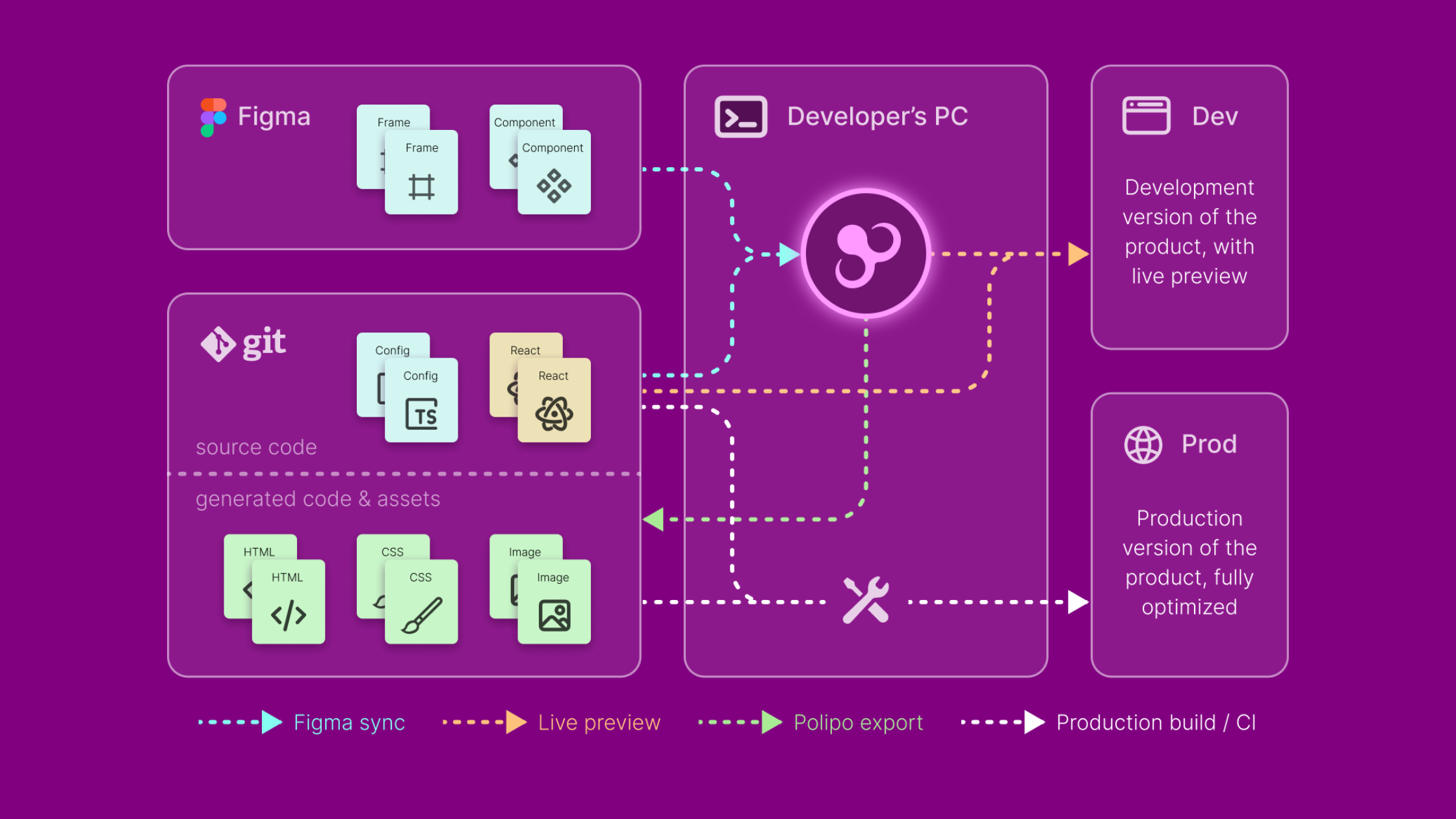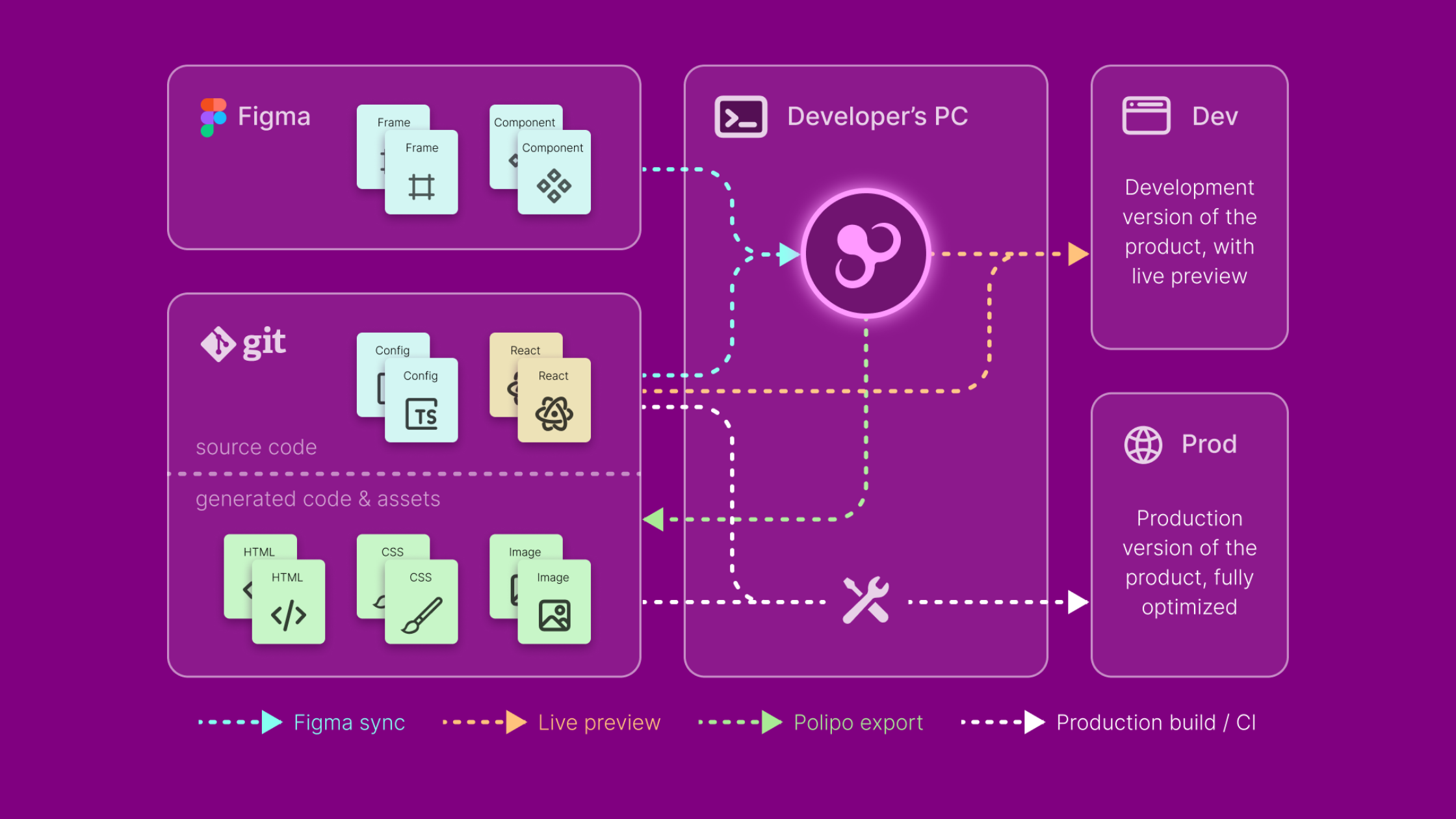
When we explain what Polipo does, people often give it a label: "Polipo is a code generator." Technically, this is true—Polipo generates code—but this description places us in the same category as many other, fundamentally different tools.
We've often found ourselves explaining Polipo by comparison, highlighting how we stand apart from the myriad AI-powered Figma-to-code generators on the market. We stress that Polipo isn’t "just another code generator" to prevent developers from writing us off, without truly understanding the power behind our approach.
One of the most frequent questions we get is: "What is the quality of the generated code?" This is a valid question (answered in our FAQs), of course, but it often comes with an assumption.
When developers ask about "quality," they typically mean human-readable, maintainable code. They expect to read the generated code and modify it as they see fit. But Polipo challenges this expectation. With Polipo, there's simply no reason to edit the generated code manually.
And then it hit me: there's a word that perfectly describes what Polipo does—a word that developers universally understand. Polipo isn’t just a code generator; we’re building a compiler.
Why Is Polipo a Compiler?

It took me several months to realize that we were, in fact, building a compiler. Why did it take so long to settle on this term? I believe it's because the concepts of "Figma" and "compiler" seem worlds apart.
Figma is a design tool, right? Compilers are for code. It’s not a combination you hear often. In fact, this may be the first time you're hearing the words "Figma" and "compiler" together in the same sentence. We take pride in that. Polipo is the first Figma Compiler.
"Compiler" vs. "Code Generator"—What’s the Difference?
At this point, you might be thinking: "Okay, Polipo is a compiler, so what? Isn't that just another way to say code generator?" Let’s unpack that.
Forget about Figma for a moment. When you hear the word "compiler," you immediately think:
- The output code is machine-readable, often in binary format. It’s meant for computers to interpret, not for humans to edit.
- The output code is correct. It always behaves exactly as specified (though not always as intended—but that’s another story).
- The output code is optimized. It’s manipulated to squeeze as much performance as possible, even when this makes it ugly.
That’s exactly what Polipo does—but for Figma designs. We convert Figma designs into machine-readable, optimized HTML and CSS that’s precise, efficient, and serves a very specific purpose: render in a web page your UI, exactly as designed. (And, just like traditional compilers, we are able to do it without involving AI.)
You don't need to edit the code to add the logic. You can manipulate the design from the outside—for example, with our React library—and still be able to control every aspect of it (HTML tags and attributes, event listeners, dynamic content and data, and so on).
Figma as Source Code
At this point, it might sound odd to refer to Figma as "code," but stay with me. Let’s go back to the basics. From the text of the GNU General Public License, section 1, first paragraph:
The "source code" for a work means the preferred form of the work for making modifications to it.
For many, Figma is the preferred form for modifying their work. This is why Figma supports features like components, auto-layout, styles, properties, and variables. When you think about it, these tools don’t create any new visual element; they simply make it easier to modify designs efficiently—and designers love them for it.
So, while Figma may not look like traditional code, it plays a similar role. It’s almost always easier to make UI changes in Figma than it is in raw CSS—especially when these features are used correctly. If that weren’t true, designers would skip Figma altogether and write CSS from the start, right?
"But I Still Need Code!"
Of course! Just like you can’t write a calculator purely in CSS (though people have tried), you still need code to bring interactivity and structure to a UI. Figma handles some visual aspects, but there will always be other layers—HTML, CSS, JavaScript—that require direct coding. That’s perfectly fine. The key is to use the right tool for the right task.
This is where Polipo shines. We don’t replace code. We make Figma part of your codebase. You choose which layer of abstraction—Figma or custom CSS—is better suited for the problem at hand.
A World Without Compilers
Imagine coding without compilers. We’d all be writing in assembly language—or worse, in raw binary. And we would spend a larger and larger fraction of our time engaging in menial tasks, addressing the most minute details of the specific architecture we are targeting.
Compilers changed everything by allowing developers to work at a higher level of abstraction. We focus on the logic and structure while the compiler handles the menial tasks. Yes, sometimes we need to dive into low-level code, but only when it’s absolutely necessary.
That’s exactly what Polipo does for Figma. We empower developers to choose when to deal with the intricacies of the web platform and CSS and when to work at a higher level.
Polipo Empowers Developers

Polipo doesn’t aim to replace code. It doesn’t replace CSS. And most importantly, it doesn’t replace developers. It’s just a tool and it lets developers decide when to engage with the complexity of web development and when to focus on higher-level work.
But the upside is huge. By treating Figma designs as part of your codebase, Polipo bridges the gap between design and development. You get the best of both worlds—designs that can be modified easily and high-quality code that implements the logic. Working together, thanks to the first Figma compiler.
Would you like to try Polipo?
Start here.